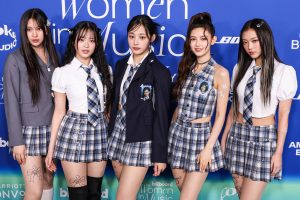The ongoing scandal and discord between the powerful K-pop label Hybe and one of their artist teams, NewJeans, could potentially have a massive impact on perceptions of South Korea and Hallyu. When a K-pop star cries, the stock market mirrors the emotion as investors demand accountability. The controversy displays the hidden darker layers of the K-pop industry and the K-wave.
Hybe, built on the success of Korean boy group BTS, has an extensive web of sublabels now extending to the United States, developing new acts like the global girl group Katseye. Yet, this music superpower was rattled by Min Heejin, sublabel Ador’s former CEO and NewJeans producer. Min, responsible for creating many of the best girl groups in the history of the industry, such as Girls Generation, Red Velvet and f(x), claimed that Belift Lab’s group ILLIT, another new group under Hybe’s umbrella, was copying NewJeans’ style and dance concepts. Hybe in turn accused Min of a host of crimes, including embezzlement.
This struck Hybe’s stock price significantly as the public got wind of the unfolding argument. Shares have spiraled since Min’s statement, initially dropping more than 25 percent since the conflict began. Hybe stock recently took another serious hit when one of the members of NewJeans, Hanni, addressed the National Assembly about the labor inequalities K-pop idols encounter as independent contractors.
Hanni, an Australian of Vietnamese decent, called on South Korea’s Labor Committee to better protect these artists, tearfully stating, “I know it’s not going to solve all the problems in the world, but if we just respect each other, at least there will be no problems with bullying and harassment in the workplace.” Her passionate testimony accentuated the cracks in the pristine appearance of the K-pop industry.
NewJeans climbed to the top of the K-pop industry incredibly fast, with their remarkable song “Ditto” recently being ranked as the 23rd best song overall of the 2020s by Paste Magazine, while the iconic critical magazine Pitchfork labeled “Super Shy” as the 13th best song of the 2020s. The group remains in the public eye as brand ambassadors for Coca Cola and Calvin Klein, grouping them alongside other notable VIPs such as BTS’s Jungkook and Blackpink’s Jennie.
In as little as two years since their debut, NewJeans have attained a massive level of fame, generating huge revenues for Hybe. However, instead of introducing a new full album and embarking on a global fall tour in 2024, the group finds themselves embroiled in controversy, with Hybe facing $293 million in repayments.
Hanni’s declaration stressed the need for change, expressing the broader global focus on social justice. The dating scandal regarding former Riize member Seunghan dives further into the nuances of K-pop idol rights and pressures they face in the industry. His overnight rise to fame became quickly overshadowed by an alleged scandal that was claimed to have occurred while he was in high school, tarnishing his public image. Seunghan’s temporary hiatus and eventual departure from Riize after death threats and funeral wreaths were sent to his label, SM Entertainment, by Korean fans, underlines the extreme lack of adequate support for idols in the K-pop industry.
With both the NewJeans and Riize incidents, the Korean culture of purity and submission met the global reality of the more liberalized views that most Western industrialized nations share. These negative events gained significant attention for the first time on such a scale, prompting controversial opinions from domestic and global fans and causing a divide in perception and expectation. Vilifying a member of a boy group simply because they dated in high school, or a girl group because they will not bow down to the CEO of Hybe, calls for cultural evolution within the industry to bridge the gap between domestic thought and those of the invested global audience.
South Korean author Han Kang recently won the Nobel Prize for Literature, shocking the entire industry and country. It was a massive boon for Korean culture. Yet, if soft power is going to be a positive expression of national culture and a force for good, it must confront the inevitable internal backlash in the originating country. Koreans themselves might reject the vision the architects of culture create for them. This further highlights the growing tensions between the traditional cultural values of South Korea and the progressive views of audiences overseas.
Will the K-wave rebound as a transformative source of Korean cultural power, or follow the legacy of Blackpink, the famous Korean girl group that has seemingly decamped to Los Angeles and Paris to join the global community? Will the effects of highlighting the darker side of K-pop affect its ability to project soft power? Can the Korean wave, Hallyu, remain a positive force for Korea or will it break up among the rocks of global opinion?

































